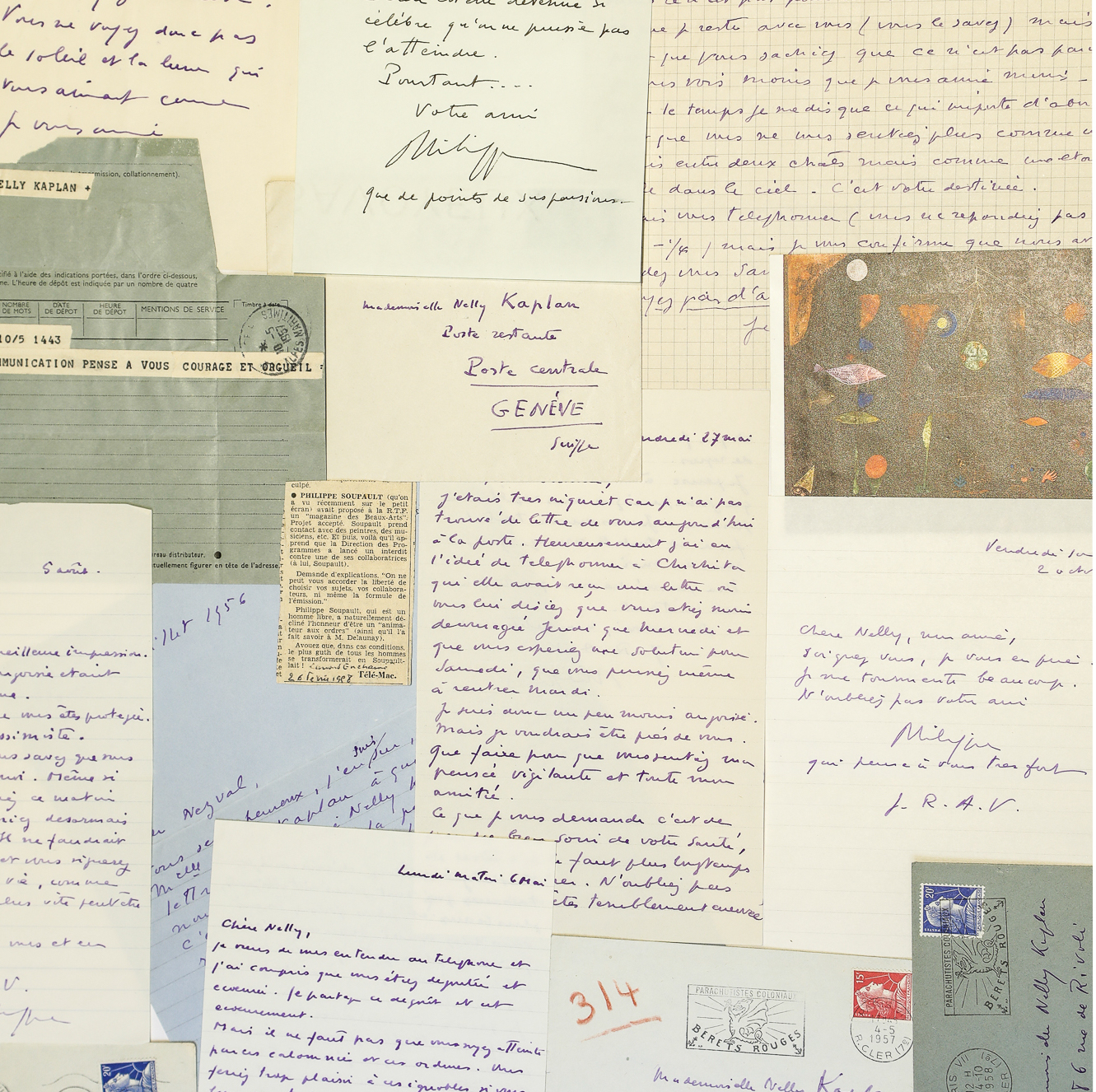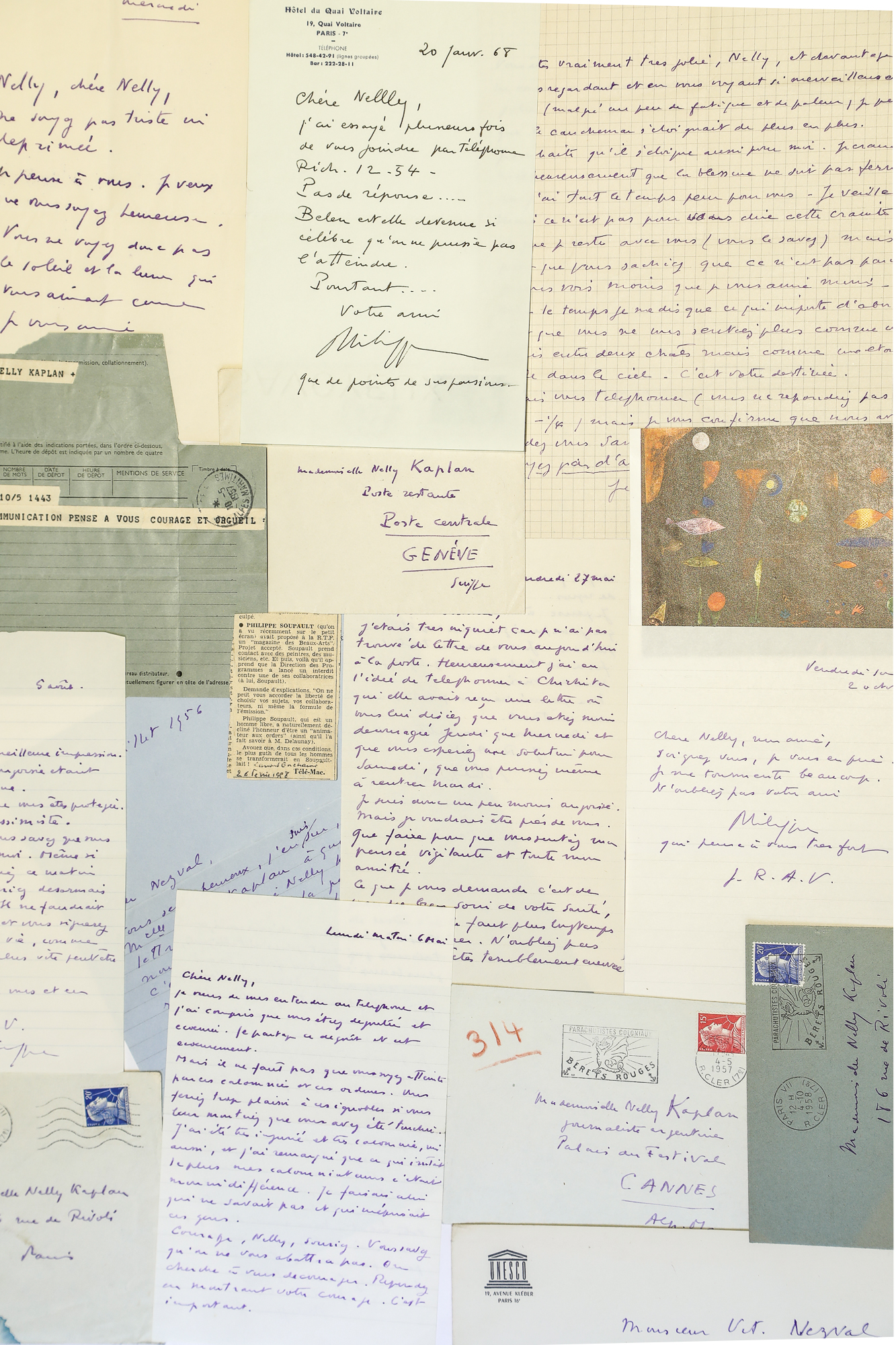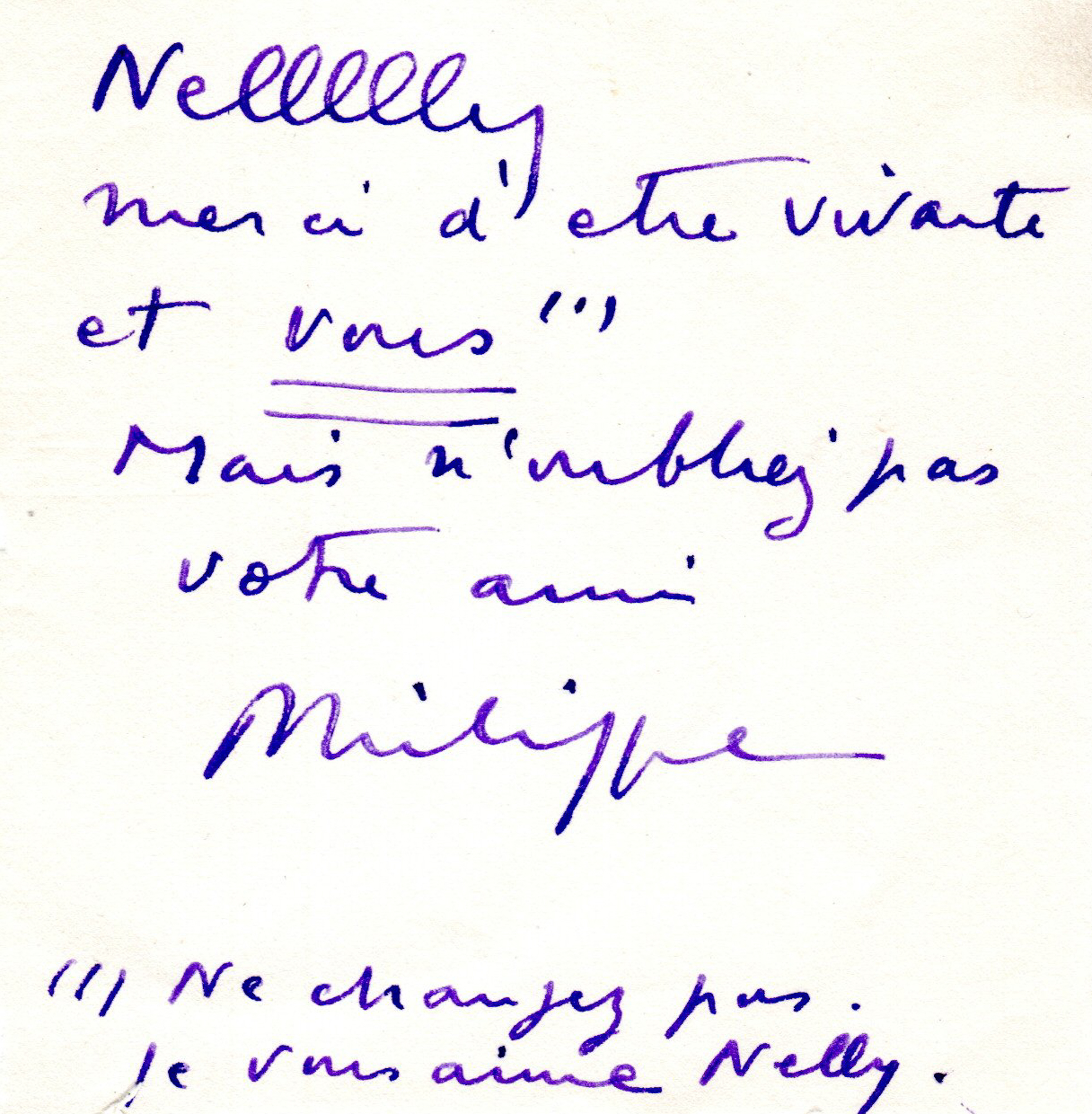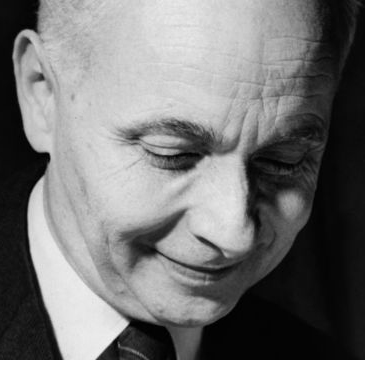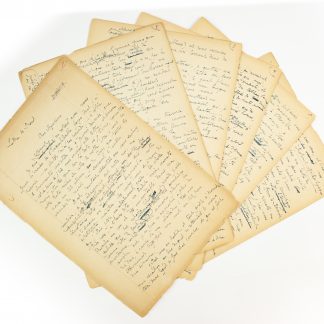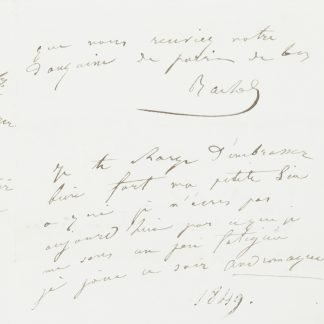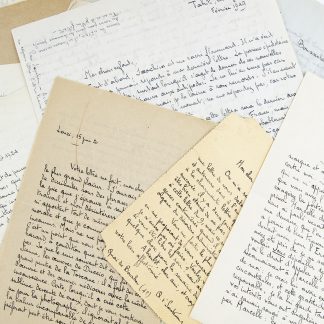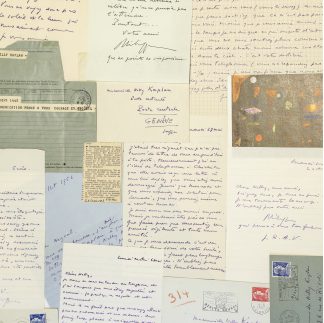Description
EXCEPTIONAL AUTOGRAPHIC CORRESPONDENCE, loving and literary, addressed to the writer and film-maker Nelly Kaplan.
The set includes 111 letters and 1 telegram, with 4 autograph sheets concerning the work of Nelly Kaplan.
The correspondence covers the period 1954-1971.
From the very first years of their correspondence, Soupault sent Nelly Kaplan fiery letters in which he reiterated his confidence in her exceptional abilities and the certainty that she was about to "sign her life".
PLEASE DON'T CRY.
This letter is written for you to be clear.
Nelly,
[...] In my life, I have only ever admired two people I never knew: Lautréamont and Rimbaud.
I understood, I felt that you were of the same quality as them. Be crazy with pride [underlined].
Of course I'm in love with you, because you're beautiful and wonderfully pretty, but there's something else. When I'm near you, I know that life is worth living. I beg you to have the courage of your intelligence. Don't be weak in your own eyes. You only have the right to cry when you are in my arms.
The two of us together have to be the strongest. I can assure you that I fully understand your weariness of the infernal circle. But, Nelly, you are going to live and triumph. You're going to be the most beautiful, the prettiest, the most perfumed, the most elegant, the most intelligent. What hurts me is that you don't want to understand that you are a poet and that you suffer from everything." (n.d.)
These references to the Parisian "infernal circle" permeated their correspondence until 1961. Indeed, when Nelly Kaplan met Philippe Soupault in 1954, at an exhibition devoted to Chagall, she seemed to be the victim of "slanderers" and "jealousy" ("these hostile, mediocre people who can't forgive you for the intelligence of your eyes, your grace and beauty. [...] I know that all these bastards cannot admit that you are superior to them". [12 December 1957]) against which Soupault encouraged him to fight. In 1955, he wrote: "I promise you I'm not a coward. A few years ago I was tortured with electricity. I didn't say a word. But to have someone smear you and throw mud at you is intolerable. I lost my lucidity and I should have crushed that individual like a dirty bug."(21 June) This rage is versified in his "poem for Nelly", published in the first issue of Cahiers Philippe Soupault :
I've got to kill someone tonight
or some
or even a large number in series[...]
They spit on everything I love
on your beauty on purity
about the life I love because it looks like you.Every morning on your doorstep
a pile of rubbish is heaped up
to bring you down
More specifically, Soupault was worried about the machinations of a "lady in pink":
I'm an idiot (at least I hope I am) because I'm worried about you. The lady in pink is like a nightmare to me and a threat to you. I can't stand the idea that she can get to you. In retrospect, I broke out in a cold sweat thinking about the forgotten letters, the carelessness and hysteria of that mad murderess who dared to touch you.
I promise you (and you know it, my dear friend) that it is not out of base jealousy, or even hatred that I am writing to you to be wary. There is a danger against which I want to protect you the man from [conj. "Rome"] seems to attract these strange curses (we have both suffered terribly from them this year). So we must be on our guard more than ever (25 August 1955).
And perhaps there is indeed cause for concern: Soupault is married and Nelly Kaplan has other parallel relationships that complicate their 'friendship':
Above all, don't be saddened by these nasty letters. This man is mad. This jealousy is certainly worrying and I think very painful for him. But do you think that our friendship, which he must feel because he is so intuitive, and which he must guess with his antennae what is true, sincere and strong, does not give him reason (no reason, since he must have none) to torture himself? (4 October 1954)
It was during this period that Nelly Kaplan became romantically involved with the filmmaker Abel Gance, a relationship she documented in the double feature And Pandora had two! - My swan, my sign. A source of concern for Soupault, who wrote: "It seems to me that, emotionally, what matters most to you is the affectionate admiration (perhaps it's more) you have for A. G."(s. d.). Or again, anxious because Abel Gance had tried to obtain his telephone number:
I therefore assume that G. wants to know
1°) if I am in Paris (and not in the south of France)
2°) wants to see me to talk about you.
In the second case, I want you to send me a letter as a matter of urgency to tell me what I should avoid talking about (28 September 1955).
Nelly Kaplan met Abel Gance in 1954 and became his assistant. During the course of their collaboration, Soupault offered her encouragement during the sometimes trying shootings. Many letters reached her in Zagreb, where she was working on Austerlitz : "I sense that you're disappointed by this experience, and I'm sorry. I had a feeling that the atmosphere and surroundings of this film would be nothing to write home about, but I had no idea it would be so dreary.." (14 November 1959) He also wrote to her in Rome during the preparation of the film Cyrano and d'Artagnan : "I have a feeling that the 'climate' in Rome hasn't improved and I'm afraid you're going to be overwhelmed by this flood of stupidity, nastiness and contradictions."(21 July 1962)
In this often tortured correspondence, Soupault combines accounts of Parisian life ("I spoke with S. Guitry (shame on him), an old fool, and with Gabin, a drunkard."In his letter of 21 June 1955, the poet wrote to Nelly Kaplan with news of the progress of his work and promises to send her books and journals, although she was frequently absent for health reasons. But his bouts of misanthropy sometimes forced him into long silences, and their relationship seemed to wane from 1965 onwards, the year in which the poet, distraught by the death of his friend Muriel Reed and ruined, isolated himself: "Please don't be angry with me for not calling you. I'm going through another crisis of anger, disgust and resentment" ; "I'm struggling between suicide and madness"(13 January 1965); "Please, Nelly, you have to understand that I'm really ill and that living alone is difficult enough, but facing other people is terrible."(13 April 1965) In 1968, he wrote to her, disappointed at not being able to reach her: "Has Belen become so famous that it's impossible to reach her? And yet..."(20 January 1968)
While it would be difficult to ignore the amorous nature of the correspondence, Soupault took a close interest in Kaplan's artistic career. He was enthusiastic about the prospect of filmingAusterlitz, looking forward to future collaboration: "As for the Austerlitz affair, what a joy if it could work. It would be an apprenticeship that would begin and end. We could try making films together."(17 May 1958)
He also encouraged him to make a short film about Gustave Moreau, although their opinions differed on certain points:
I'm very happy to know that you have some chance of making your film about G. M. It's a path I'd like you to follow. [...] As for the mysogyny [sic] of G. M., beware... all the men of that great era, even the most gifted (!) (Maupassant, Flaubert, Huysmans) were mysogynists [sic]. It was a fashion and a way like any other of admitting their inferiority. I'd like to discuss this attitude with you, but calmly [underlined] without you (or me) getting angry (28 December 1960).
When the film was released, he was enthusiastic:
My congratulations. Your film is excellent. And revealing. Lucidity, intelligence, cunning, skill and technique triumph. I also realised, while admiring your film, that you were a warrior and that you had to be a warrior. Ruthless. At least in appearance. And for you, after so many years, appearance is necessary. (1st June 1961)
But it was above all his literary work that aroused Soupault's admiration:
I am convinced that you must write. You are destined for this kind of reflection, this kind of expression. [...] I'm very curious about what you're going to write from now on. I still prefer the Queen [of the Sabbaths] to geometry [in the spasms]. Stranger and even more striking. [...] I like when you write and what you write. But you know you don't just write anything. And that's another reason why you don't feel communicable. That's also why Arthur Rimbaud didn't feel communicable. People called him a thug, you a panther (3 November 1959).
He passed on news of the success of Geometry in spasmspublished in 1959 under the pseudonym Belen: "Saw Losfeld this morning. He told me in front of witnesses that geometry had been doing very well (sic) since the prayer for insertion (!!! - L. knows how to flatter more than pay). He intends to ask you for texts for a collection he wants to publish." (6 June 1959) In 1960, he complimented a new collection: "I love Deliver us [from the male] and I look at this book as a fruit and a precious stone (ruby and sapphire)."(24 June 1960)
Attached to the correspondence are 4 autograph sheets, letter essays on Kaplan's written work: The Sunlight at Austerlitz (1960), a diary of the filming ofAusterlitz (2 drafts), an article on all his poetry collections entitled "Who is Belen?I didn't hesitate to write what I thought, which was that a masked poet (I'm sure Belen is a pseudonym) was stepping forward, all claws out, and offering us a new art of loving, living and suffering."), and finally an article on Geometry in Spasms :
For me, 'The Geometry of Spasms' is closer to Rimbaud's 'Illuminations' (and I know what 'Illuminations' means) than to any of the elucidations of Jules Verne's pale disciples, who never achieved his vertigo but accepted his bourgeois worldview.
The two artists never actually collaborated on a work. Soupault did, however, write the preface to Reservoir of the sensesHe dedicated the libretto of the opera "The Little Mermaid" to the woman he sometimes called his "Little Mermaid". The little mermaidcomposed by Germaine Tailleferre and premiered on 30 September 1960 at ORTF (Radio-France) by the Orchestre lyrique conducted by Michel Le Conte.
A variation on "ma petite sirène" (my little siren) in Soupault's correspondence, "ma petite Ondine" (my little Ondine), which also appeared -- more confidentially -- in his writing. Nelly Kaplan writes in the testimonial that opens the book Cahiers Soupault I, "I salute you Philippe, full of revolt":
"In one of her texts (which I believe is unpublished), La Petite Ondine, a "fabulous opera", the heroine sings: "I am only afraid of becoming what you are and will become".
A word to the wise...
Then, on another page of the libretto, the Little Ondine insults: "You want me to stay close to you so that you can love me in your own way (...) And I want you to love me in my own way, so that I am free not to be a slave to your love. Love me, so that I can be free.
Chorus: We love you.
La Petite Ondine: But do you love me enough for me not to love you?"
EXCEPTIONAL ENSEMBLE.
A few stains, a few browned leaves.

